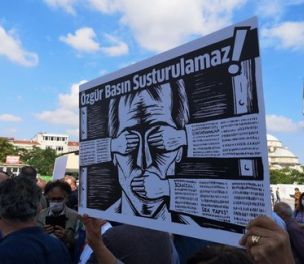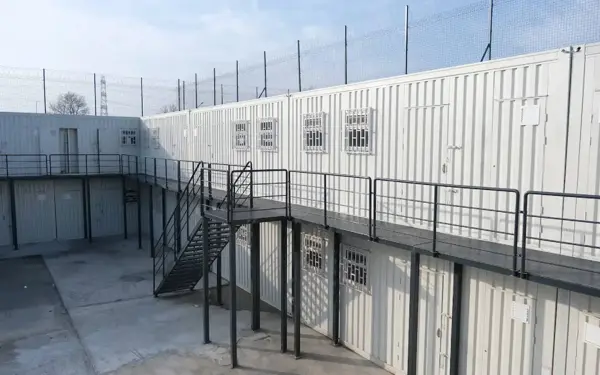"Journalism is not a crime"
Click to read the article in Turkish
On October 4, the parliament approved the first two articles of the 40-article "disinformation law" as it is called by the government but publicly coined as the "censorship law".
The passed articles moved internet news portals and journalists working for these portals into the Press law. These two articles appear to be the most innocent, but still have sparked reactions among journalists and opposition MPs.
The reason for this response is the hypocrisy of the government, according to the academic Emre Tansu Keten. As one of the Academics for Peace, he was dismissed as a research assistant at Marmara University Faculty of Communication by a statutory decree.
"It is a positive development that news portals and journalists working for them be included in the Press Law," he says, but also warns that this is a "bait," trying to justify more important articles in the bill.
Keten says, "They have inserted a few favorable articles in the law, however as a whole it will result in censorship," adding that the government is distributing press credentials according to its own definition of an 'acceptable journalist' at the moment and that the changes made are meaningless. Taking news portals and the journalists working there into the Press Law does not mean that all journalists will be employed in the scope of this law.
The "Disinformation Law"According to the proposed law those who work for internet news portals will be regarded as journalists and they will be able to apply to the Department of Communication for a press credential. Public employees working in information services in public institutions, radios and televisions will also be able to receive press credentials. Internet news portals will be taken within the scope of periodical publications. The proposal reads, "Those who publicly distribute information which is not really related with the security of the country inside or outside, public order or public health with the purpose of creating concern, fear or panic among the people in a manner that domestic peace may be destroyed will be punished with an imprisonment sentence of 1 to 3 years. With the proposal, reporting offensive content related to the National Intelligence Agency activities and personnel is included within the scope of catalog crimes. |
The Communications Directorate
"The reality of the sector is that journalists are working at the mercy of their employer," he says.
"This law brings to mind a question; were the news portals and their journalists illegal before the law? They were not, but they did not have legal status. However, even the journalists working in newspapers that had a legal status were not employed within the scope of the Press Law.
"For example, how many of the journalists working for Hürriyet daily are subject to Law no. 212? [Law no. 212 is the Journalism Labour Law, dated 1961] This is the tactic of media bosses since the 90's. They are not employing the journalists subject to 212, but they register them in other sectors. In fact, a news editor, but employed as an information systems employee.
"So the employer does not need to hire according to the Press Law. The new bill does not bring this obligation either. However, at least the new law opens the way for this. News portals and media institutions that care about this will be able to employ and register their employees according to the Press Law.

"Another point, it does not mean that all journalists working for internet newspapers will be given press credentials when they are subject to the Press Law. Most recently the press credential of Tuğrul Eryılmaz, which he held for 47 years, was canceled. There are many journalists whose credentials are canceled, not renewed, or not given.
"Therefore, although this may seem a positive development, it is unrealistic to believe that journalists working in critical media institutions will be given press credentials.
"In the west, press credentials are associated with a professional definition and some ethical codes. It is being used to define a certain area. It is even rare that it is the state authority itself granting press credentials.
"In general, it is more common for professional associations to establish a committee to grant press credentials. This is not the case in Turkey. It is already an oddity that the state is granting press credentials but there is also this fact present, which is called the 'Department of Communication."
"The Communications Directorate is a propaganda and political communication strategy institution working for the AKP [the ruling Justice and Development Party]. The new law will turn the press credential into a card for themselves. If anything serious is to be done about the press credentials, this task should be left to a commission to be established by professional organizations.
"Who will decide that a report is 'fake news'?"
Keten also says that many new news portals will emerge to get a share of advertisements to be given by the Press Advertisement Institution (BİK). Other already existing outlets will 'clean up their acts' for the same purpose. And those that do not will have to spend their time dealing with disclaimers. And this will bring with it auto-censorship and censorship.
Keten explains: "It is obligatory to publish a disclaimer where the original report was published. So they can block the main page of a news portal with disclaimers. Even just the disclaimers may turn into a censorship mechanism."
"The news portals and newspapers can fall into the grip of disinformation." Keten says, adding, "Communication academy has been discussing what disinformation is for a thousand years and with no outcome. Who will decide if a report is fake or deceptive when this is such a complicated issue?"
He gives the example of establishing the Unit for Fight Against Disinformation under the Department of Communication. He cites the statement by İdris Kardaş, head of the unit, saying "It is an honor to be part of Erdoğan's struggle for the truth." Keten says, "Even if we only take this discourse, it is apparent where they want to arrive at in the future."
He then goes on to say: "The first stage of AKP restrictions on media was taking over the conventional media. They achieved this to a great extent in 2018 with Demirören taking over Doğan Media. 4 months later, the Department of Communication was constituted.
"Immediately after that came the second stage. This was the operation against internet news portals which they could not control. This law is the final part of that operation.
"The Press Advertisement Institution, disclaimers and press credentials will constitute the first stage of censorship. The threat of imprisonment will serve as the second. In the end this censorship law will be a tool to silence the media and the journalists." (HA/PE/VK)





.jpg)
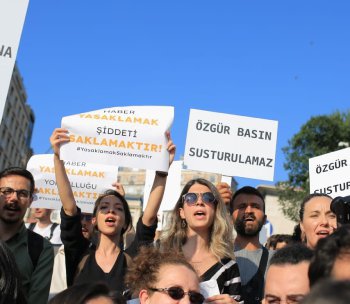

as.jpg)
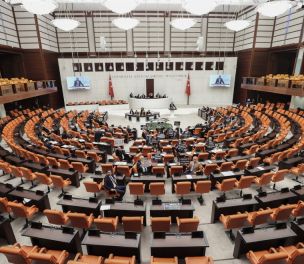
sa.jpg)
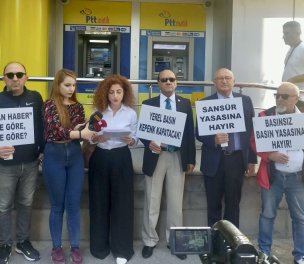
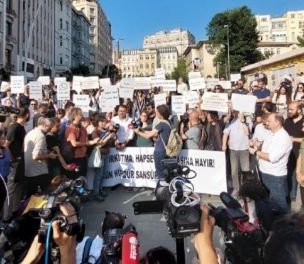
as.jpg)
